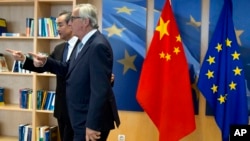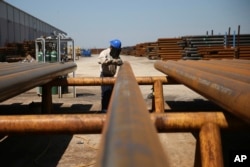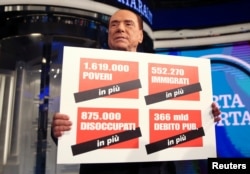Casting their eyes south, European Union officials could be forgiven for recalling the proverb about misfortunes never coming singly.
For the past week they have watched nervously as populists in Italy formed chaotically a euro-sceptic coalition government, which plans to raise public spending in breach of the bloc’s rules, and deport half-a-million migrants.
And now they have an unnerving continuing political crisis in Spain, where new socialist prime minister Pedro Sánchez, who was sworn into office Saturday, will be dependent on votes from anti-establishment and separatist lawmakers if he’s to survive and avoid a snap parliamentary election.
On top of the political perils, they are having to contend with increasingly poisonous Brexit negotiations.
And the EU is facing the prospects of a transatlantic trade war triggered by U.S. President Donald Trump’s decision last week to impose tariffs on EU steel and aluminum imports — a further indication that Washington, as far as the Europeans are concerned, is no longer the reliable guardian of a post-World War II order the U.S. largely shaped.
But for Brussels the storm clouds scuttling in from the south represent the most immediately dangerous and potentially existential threats to the EU’s project of closer political and fiscal integration, admit EU officials.
“Southern Europe is now ground zero for us,” a senior EU official told VOA. He says Brussels will need to handle both countries carefully, “if we are to avoid inflaming likely confrontations with the Italians and Spanish over spending plans and how to handle migrants and even separatists.”
On Sunday, Jean-Claude Juncker, the normally abrasive and uncompromising president of the European commission, appeared to eat some humble pie, announcing meekly that Brussels and “German-speaking countries” mustn't repeat errors made during the Greek crisis by offering stern lectures on the state of public finances and the need to abide by EU rules.
That remark stood in marked contrast to inflammatory comments he made Thursday when he said the EU shouldn't be blamed for Italy's indebtedness, arguing Italians needed to work harder. One of his commissioners, Günther Oettinger, added insult to injury when he gloated at the meltdown in equity and bond markets, which he said would teach Italians a lesson about voting for populists.
Now Juncker says he’s determined to avoid feeding the populist narrative that the EU is meddling high-handedly in the domestic affairs of member states. He noted happily that M5S and Lega had both recently dropped their policy of dropping the euro.
Opposite directions
But few observers think peace will reign between the populist coalition government in Italy and Brussels — the two are heading in opposite directions.
Paolo Savona, the 81-year-old economist who was blocked by President Sergio Mattarella from becoming finance minister because of his support for abandoning the euro is now minister for European Affairs. That’s hardly reassuring for Berlin — in the past he has compared Germany’s post-World War II rulers to the Nazis. The new minister for families, Lorenzo Fontana, is opposed gay marriage and wants a rolling back of LBGT rights enshrined in EU treaties and has praised Vladimir Putin’s 'family-centered values.’ Like others in the Italian coalition, he argues sanctions on Russia, imposed by the West in retaliation for Putin’s annexation of Crimea, should be lifted.
On Monday, Matteo Salvini, the leader of Lega and now Italy’s interior minister, reacted with fury to allegations leveled by Hungarian-American billionaire investor George Soros that the Kremlin might have bankrolled the Lega. Speaking at an economic conference Sunday in northern Italy, Soros said Salvini's links to Putin should be investigated. “I am very concerned, there is a close relationship between Matteo Salvini and Putin,” Soros said.
In a statement Salvini retorted: “We have never received any lira, euro or ruble from Russia. I think Putin is one of the best statesmen in the world and I am ashamed someone as speculative and unscrupulous as George Soros was invited to give a speech in Italy."
The first clash between Brussels and Rome will likely come on the migrant front, though. Salvini is making clear he means to get started quickly on delivering on his election promise to oversee mass expulsions of half-a-million illegal migrants and to truncate the asylum process. “The good times for illegals are over: get ready to pack your bags,” he said Saturday at a rally in north Italy.
He pledged to press the EU for asylum law reform but emphasizes that come what may Italy will will no longer serve as the refugee camp of Europe. “France and Germany cannot leave the burden of this disaster on the shoulders of the coastal nations,” he said.
Spain
In Madrid there’s also little to reassure nervous EU officials.
Sánchez, a photogenic economist and former basketball player who was sworn into office Saturday, won the support of half-a-dozen other parties to oust prime minister Mariano Rajoy over a massive corruption scandal. Sánchez has promised to keep Spain, the eurozone’s fourth largest economy, aligned with the EU, and his Socialist party is a staunch supporter of the euro, but he commands less than a quarter of the seats in parliament.
His government will depend on votes from an unlikely coalition of motley parties — dubbed “Frankenstein” by critics — including the far-left Podemos, two Catalan pro-independence groups and a Basque nationalist party.
Podemos (We Can), Spain’s third largest party, like M5S and the Lega, believes the euro has helped impoverish southern Europe while enriching Germany. It says the euro is a “mouse trap,” arguing “it is materially impossible to pursue policies that satisfy the national interest” within the existing currency framework. Podemos has stopped short of calling for Spain to drop the single currency, but it wants major changes to the euro’s governance and wants a massive jump in public spending, a position supported by a large section of the Socialist party and one which would breach EU budgetary rules.
Podemos also wants the debt of EU members to be pooled — a red flag to Germany lawmakers. Few political observers in Spain are forecasting that Sánchez can survive for long as prime minister and they are predicting early elections, which will likely result in a hung parliament, heightening the sense of instability in southern Europe.













